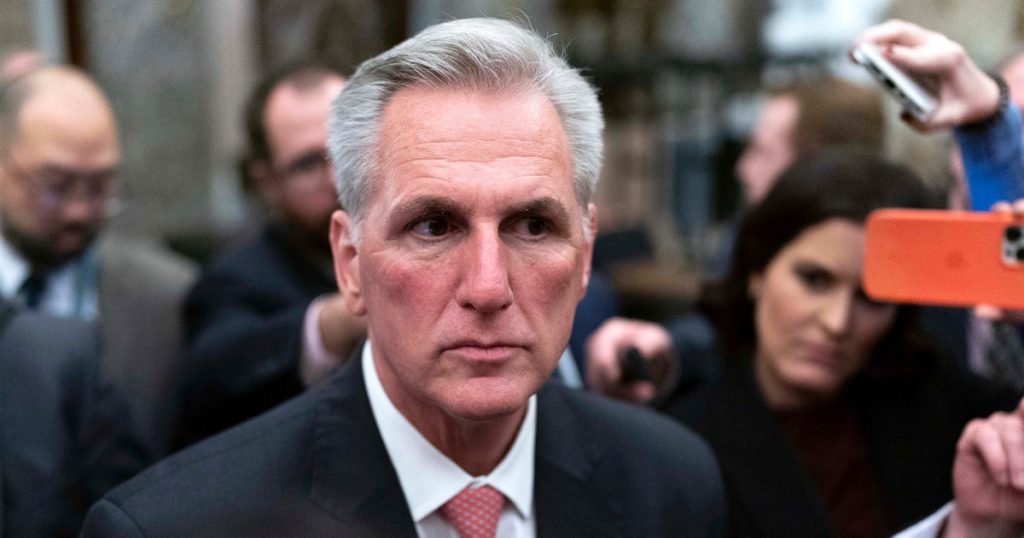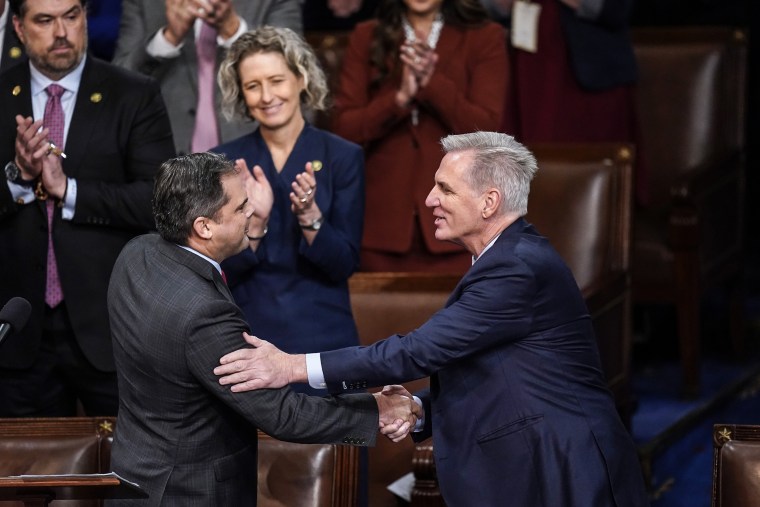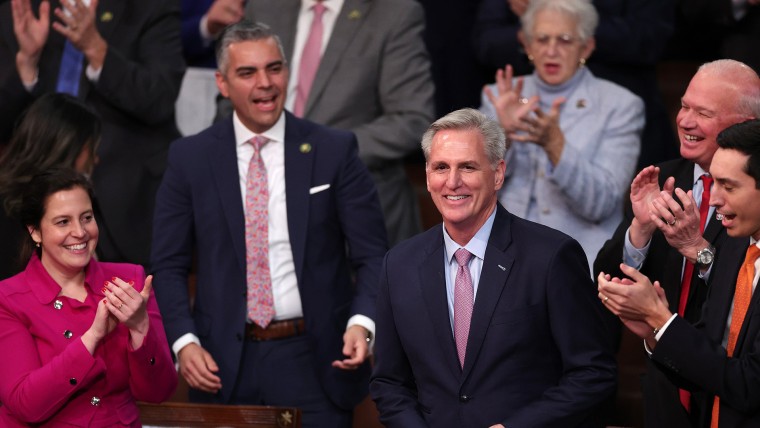
WASHINGTON — GOP leader Kevin McCarthy beat back a conservative rebellion and won election as the 55th speaker of the House early Saturday morning, following a chaotic confrontation on the House floor between his allies and his far-right opponents and ending four days of deadlock.
The California Republican’s narrow victory came on the 15th ballot — the fifth-longest speaker vote in American history by number of ballots and the longest such vote in 164 years.
McCarthy received 216 votes and all six of his remaining GOP detractors agreed to vote present, helping to lower the number of votes needed to win the coveted gavel. All 212 Democrats rallied behind their nominee, Minority Leader Hakeem Jeffries of New York.
As he crossed the vote threshold, a beaming McCarthy received a raucous standing ovation and warm embraces from his colleagues. He acknowledged his wife and family in the gallery above as Republicans chanted, “USA! USA!”
“There was great hope and then crashing down and resuscitation,” Rep. Patrick McHenry, R-N.C., a former member of McCarthy’s leadership team who nominated him earlier in the day, told reporters of the “roller coaster” ride.
“There’s so many twists and turns.”
Becoming speaker of the House has been a career ambition for McCarthy, who served as a House staffer and a minority leader of the California Assembly in Sacramento before being elected to the House in 2006. A prolific fundraiser and backslapper, he has methodically risen through the ranks of the House Republican leadership team — chief deputy whip, whip, majority leader and GOP leader — over the past 14 years.
McCarthy, 57, is now the highest-ranking Republican in the nation, and second in line for the presidency.
Jeffries handed McCarthy the gavel shortly after 1 a.m. Saturday. In his acceptance speech, McCarthy promised that the House will be a check on President Joe Biden and his policies.
“You know — my father always told me: It’s not how you start, it’s how you finish,” said McCarthy, the son of a firefighter. “And now we need to finish strong for the American people.”
McCarthy’s win came shortly after tempers boiled over and pandemonium broke out on the House floor late Friday night when McCarthy and his allies suffered defeat on the 14th straight ballot after miscalculating that they had the vote wrapped up.
When his conservatives detractors again denied McCarthy the gavel, Rep. Mike Rogers, R-Ala., the incoming chairman of the powerful Armed Services Committee, charged at McCarthy foe, Rep. Matt Gaetz, R-Fla., and began angrily shouting. Rep. Richard Hudson, R-N.C., had to physically restrain Rogers, pulling back his shoulders and at one point putting his hands over Rogers’s mouth.
Others nearby also stepped in before Rogers stormed off.
“That was a very tense moment and I was just trying to play a role to keep the tensions down,” Hudson said as he left the floor.
Rep. Tim Burchett, R-Tenn., was seated between Rogers and Gaetz when the altercation occurred. Photographs show he also tried to restrain Rogers.
“It’s just an unfortunate moment is all it was. It shouldn’t have happened. He shouldn’t have crossed that line,” Burchett told reporters. “Nobody’s gonna put their hands on me, nobody’s going to threaten me. That’s it. Bottom line.”
Moments earlier, McCarthy himself had walked from his seat, down the center aisle to Gaetz and Rep. Lauren Boebert, R-Colo., to try to flip their present votes to yes; that would have secured the speaker’s gavel for McCarthy.
But when he was unsuccessful, it set off Rogers, who has served alongside Gaetz for years on the Armed Services committee.
“Just another Friday in Parliament,” Burchett quipped. “You know, democracy’s not a pretty thing. It is a fight all the time.”

For three days this week, a band of roughly 20 conservative hard-liners voted 11 consecutive times to block McCarthy from winning the prized gavel, even as former President Donald Trump was personally dialing up McCarthy foes to end their opposition. Some called on McCarthy to drop out, while others placed demands on him that jeopardized his fragile GOP coalition of moderates and conservatives.
The intraparty standoff paralyzed the House of Representatives, preventing all 434 members from being sworn in, bills from being voted on and committees from being formed. Some lawmakers lamented they had lost their security clearances and could not receive classified briefings.
It marked a rocky start for the new House GOP majority.
But a breakthrough came on Day 4 of the stalemate. After days of difficult closed-door negotiations, leaders of the far-right House Freedom Caucus extracted a suite of concessions from McCarthy. They included promised spending cuts; a package of rules changes that empowered members and watered down the speaker’s power; and giving HFC members seats on Rules, Appropriations and other powerful committees.
One key concession McCarthy gave to the agitators: Reinstating a rule giving a single lawmaker the power to force a vote to oust a sitting speaker in the middle of the term, a change that almost certainly will haunt McCarthy in the months to come. Previously, McCarthy had agreed that at least five members would be needed to make that “motion to vacate” the speaker’s chair.
In exchange, when the clerk read the roll call on the 12th ballot Friday, 13 of the 20 conservative rebels switched their vote to McCarthy, handing him a surge of momentum after a grueling week of defeats.
On the next ballot, a 14th holdout joined them.
In a dramatic scene, Reps. Dan Bishop of South Carolina, Josh Brecheen of Oklahoma, Michael Cloud of Texas, Andrew Clyde of Georgia, Byron Donalds of Florida, Paul Gosar of Arizona, Anna Paulina Luna of Florida, Mary Miller of Illinois, Ralph Norman of South Carolina, Andrew Ogles of Tennessee, Scott Perry of Pennsylvania and Keith Self of Texas and Chip Roy of Texas stood one by one on the House floor and announced their vote for McCarthy — cheered by their Republican colleagues each time.
On the 13th ballot, Rep. Andy Harris, R-Md., threw his support behind McCarthy as well after repeatedly opposing him.
A 15th Republican, Rep. Victoria Spartz of Indiana, changed her vote from present back to McCarthy.
The fresh support still didn’t earn McCarthy the majority of all House members voting, which he needed to win the speaker’s gavel. But it did hand him a much-needed surge of momentum as members closely watched to see whether his support would fall or rise as the impasse dragged on.
By Friday evening, the final holdouts — once dubbed the Never Kevins — conceded that McCarthy would be elected speaker. Because of the GOP’s razor-thin, four-seat majority, he needed every last vote to get him across the finish line.
Rep. Wesley Hunt flew back to Washington from Texas, where his wife had just prematurely given birth to their baby. And Rep. Ken Buck flew back from his home in Colorado, where he had a medical appointment.
After the successful vote, an exhausted but exuberant McCarthy walked into Statuary Hall, stood before reporters and television cameras, and made sure he publicly acknowledged Donald Trump.
“I do want to especially thank President Trump,” McCarthy said. “I don’t think anybody should doubt his influence. He was with me from the beginning. … He was all in.”
He and his entourage then walked into the speaker’s office. Above the doorway was a brand new sign: “Speaker of the House Kevin McCarthy.”
 Latest Breaking News Online News Portal
Latest Breaking News Online News Portal






